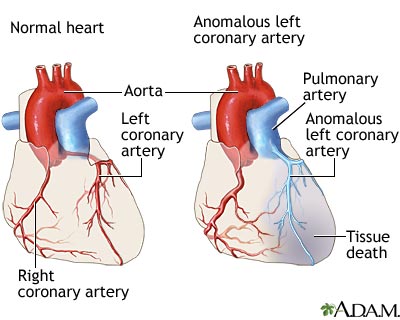Treatment
Surgery is needed to correct ALCAPA. Usually only one surgery is required, depending on the baby’s condition and the size of the involved blood vessels.

If the mitral valve is seriously damaged from lack of oxygen, the baby may also need surgery to repair or replace the valve. The mitral valve regulates blood flow between the chambers on the left side of the heart.
If the baby’s heart is already severely damaged from lack of oxygen, a heart transplant may be an option.
Very ill babies may need treatment with medications before surgery. The medications help the baby get strong enough to have surgery.
Medications include:
* “Water pills” (diuretics )
* Medications that make the heart muscle pump harder (inotropic agents)
* Medications that lower the work load on the heart (beta-blockers, ACE inhibitors)
See also: Congenital heart defect corrective surgery
Prognosis (Expectations)
Without treatment, most babies do not survive their first year. Those who survive without treatment are likely to have severe complications, or die suddenly during the following years.
With timely treatment, most babies do well and can expect a normal life. However, they need routine follow-ups with a heart specialist (cardiologist).
Complications
Complications of ALCAPA include:
* Heart attack
* Heart failure
* Heart rhythm problems
* Permanent damage to the heart
* Permanent damage to the mitral valve in the heart, requiring repair or replacement later in life
Calling Your Health Care Provider
Call your health care provider if your baby:
* Is breathing rapidly
* Looks very pale
* Seems distressed and cries often
Anomalous left coronary artery: Overview, Causes
Anomalous left coronary artery: Symptoms & Signs, Diagnosis & Tests
Anomalous left coronary artery: Treatment
Reviewed By : David Zieve, MD, MHA, Medical Director, A.D.A.M., Inc.
